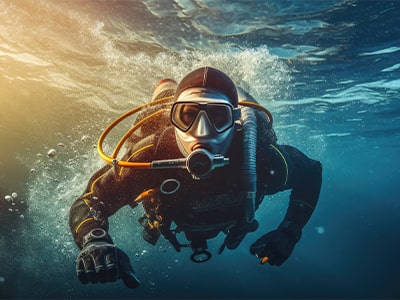
Relationships
Dive Deep
Dive Deep
I love the depth of the ocean. The coldness of the water on my skin, the virginal experience of visiting this uncharted underwater land. The infinite colors and fish all around. The experience of profound oneness with the current, the flora, the infinite life that surrounds you from every possible direction. As a diver, I often contemplated how scuba diving is an incredible analogy for relationships.
Rule #1 – Dive Buddy. As a certified diver, you know that the first rule of diving, thus relating, is that you need a dive buddy. – You can't do this alone. You need someone to share this experience with. You need someone to be there in your support and offer help if something goes wrong.
Rule #2 – Communication. Communication. Diving into a relationship requires learning how to communicate with your dive buddy. When we are dry, on the shore (by ourselves), it is pretty easy to communicate our needs. There aren't many waves and emotional currents holding us back from expressing what's truly on our minds. But once we jump into the waters, we need a different set of skills. We need to make sure we catch our buddy's attention and communicate clearly enough for them to truly understand what it is we are trying to convey. Do we need more air? Have we seen a scary shark, or have we gotten entangled in conversation with a clownfish...
Rule #3 – Wetsuit. When we jump into the water… diving into relating, we wear protective gear. It helps us acclimate to the water but also numbs our senses. It keeps the cold out but prevents us from accurately sensing the world (and our partners) around us. In other words, we have walls of protection around our hearts. Some are healthy boundaries, some not so much.
Rule #4 – Adventure. Diving isn't for the faint of heart. It can be a dangerous sport. One of the top traits for divers is an innate sense of adventure and a calling to explore uncharted territory. In a way, they are pioneers. Willing to explore realms unknown and undiscovered. Real relationship divers are exactly the same. They are willing to take the time and effort to develop the skills needed to heed the calling of such an adventure. They offer wonder and excitement to connect with their buddies and explore the infinite depth.
Rule #5 – Pressure. The deeper we get, the more pressure we'll encounter. As we dive deeper, the pressure intensifies. Our ability to breathe and the amount of air in our lungs shrink. In other words – the necessity for more relating skills than we might have needed diving close to the surface. Deeper communication with our partners and a deeper sense of responsibility to what we can or cannot handle.
Rule #6 – Darkness. As you descend into the depth, there's less light, fewer colors. Most divers stay close to the surface. It's safer. Colorful. Filled with fish and life. The deeper you dive, the less you can see. The more dangerous the dive becomes. You simply need more gear and a much better set of skills. The depth is dangerous but holds a greater mystery. It is unknown, vast, alluring. When we dive deeper into relating, something of the divine is revealed, a depth of connection only silence can convey. The secret to lasting relationships lies in meaning and mystery. Both are not found in abundance at the surface.
Rule #7 – Go Slow. Ascend for more air slowly and with consideration to your dive buddy. At times, we realize, as we dive, that we failed to measure how much air we have. Our tendency would be to panic and rush to the surface. In our relating analogy, it would mean that if there are complications or challenges, we run out the door. We break-up. Divers learn to ascend slowly, ask for help from their buddies, and consider the well-being of everyone involved. If you are at the depth, the pressure, the fear, and panic will be greater. Again – go slow and connect with your partner.
Rule #8 – Safety stop. We have to learn to acclimate the air pressure as we rise back for more air. Divers learn to stop a few feet below the surface and wait for the body to adjust. In our relationships, we have to learn to have safety stops. Yes, we had a big fight... yes you did that, and I said this... but before we swim our separate ways... let's take a safety stop. Allow our hearts to acclimate, heal, rest, come out for air, and return refreshed.
Rule #9 – Don't get your fins too dry. Divers joke that if they don't dive often, their fins get dry. They miss the ocean and become anxious in their daily – non-oceanic - reality. Relationships are important for us. We are relational beings. We relate to the world around us and experience more of our hearts and our spirits through shared experiences. Swimming by a great turtle by yourself or having your beloved next to you as you do is a completely different experience. Choose to dive and dive deep; don't wait on the shore for too long.
Rule #10 –Dive Masters. Almost no one is a naturally born diver. Scuba diving is an acquired, learned skill. You go to a diving school, get certified, and dive with an experienced dive master until you get the hang of it. Most of us are not relationship experts. Often, we learned our relationship diving skills from two not-very-skillful divers. Who seem to ignore each and every one of the rules mentioned above. Diving can be dangerous and even traumatic. Don't leave your aquatic skills to chance. Invest in learning how to relate. Learn from experienced relationship "divers." Constantly improve your skills, and more than anything, don't forget to have fun and enjoy your dive.
I love diving. I love the ocean. There's nothing more fulfilling than experiencing life with a truly masterful dive buddy. The wetness of connection with the oneness of creation. The weightlessness of free falling into love. Into the pleasurable abyss. The loss of gravity you can only find when diving into the heart of a lover. The mysterious embrace of the deep, wide blue.
